- Home
- Claudia Mills
Standing Up to Mr. O. Page 5
Standing Up to Mr. O. Read online
Page 5
“Since when?” Matt sounded suspicious.
“Well, since Wednesday.” It didn’t sound very long, but Maggie was already getting tired of peanut butter and jelly sandwiches and grilled cheese sandwiches and hard-boiled eggs. She was going to have to expand her collection of vegetarian recipes.
Maggie expected Matt to say something withering. To her surprise, he looked almost impressed. “At least you’re being consistent,” he said. “Consistently wrong, but consistent.”
Mr. O. turned back to the class. Conversation time was over. But now Maggie actually wanted to talk more to Matt about dissections. Every argument he offered in favor of dissections was more material for her prize-winning essay.
Luckily, that afternoon Ms. Bealer gave them class time to work on their essays in the library. Maggie sat down at Matt’s table. “Can I ask you a couple of questions?” The librarian didn’t mind if they talked quietly.
“Questions?” Matt asked.
“About why you believe in dissections. For my opinion essay. It’s on dissection, and I want to put in the other side.”
“So I’m the other side?” Matt looked pleased by his role. “Be my guest.”
“Question number one. Do you think it’s wrong to kill people?”
“Sure,” Matt answered without hesitation. “Most of the time. Not all the time. Like, you could kill someone in self-defense. Or in a war. But most of the time, yeah, it’s wrong to kill people.”
“Question number two. If it’s wrong to kill people, why isn’t it wrong to kill animals?”
Maggie was glad to see that Matt had to think for a minute. She used the time to press on. “You don’t eat people, right? Or kill people just to dissect them? Why should you treat animals differently?”
“Animals aren’t people. That’s why we treat them differently. Animals don’t think. I told you, a worm barely has a brain. It has nothing to think with. It has nothing to think about.”
“Worms can feel, though,” Maggie said. “Squirmy didn’t like it when we shone the flashlight on him. He tried to slither away.” Maggie remembered the episode all too well.
“Stimulus/response. You do something, they do something. Squirmy”—Matt made a face at the name—“didn’t say to himself, ‘Oh, someone is shining a light on me, so I had better change direction and remove myself from this unpleasant brightness in my field of vision.’ He just reacted. The way a flower turns to the sun. Animals react to things.”
“Dogs and cats think,” Maggie said.
“I thought we were talking about worms. If I remember correctly, you didn’t walk out of a dog dissection.”
“Cows and pigs think, and we kill them. I read somewhere that pigs are one of the most intelligent animals. Pigs think.”
“Think about what?” Matt asked. “A warm bucket of slop. A roll in the mud. They’re not thinking about the theory of relativity.”
“Well, most people don’t, either. I’ve never thought about the theory of relativity in my whole entire life.” Maggie wasn’t sure what the theory of relativity was, except that Einstein had thought it up, and it had something to do with physics, and you didn’t have to dissect anything in a physics class.
Matt gave her a look as if to say, It figures.
“Just because a pig doesn’t have great thoughts doesn’t mean he doesn’t think,” Maggie persisted. “Or feel. A pig may not know about relativity, but he knows he doesn’t want to be killed and eaten.”
“A pig doesn’t know anything. He doesn’t even know he’s a pig. You’ve been reading too much Charlotte’s Web. You think every pig is Wilbur. I’m telling you, Wilbur is fiction. As in: made-up. As in: a character in a storybook.”
Maggie knew that Matt was trying to make her concern for animals sound childish, but she wasn’t going to give in. “If you stick a knife into a pig, he feels it. You can call it stimulus/whatever, but he wouldn’t respond if he didn’t feel something.”
“Okay, animals feel pain. Maybe worms feel pain, I don’t know. I’m not saying we shouldn’t care about hurting animals. But any halfway decent butcher can kill an animal one, two, three. The animal doesn’t even know what’s happening. Do you think Squirmy knew he was being killed? Oh, no, here comes the poisonous cotton ball! Get real. One minute he’s alive, the next he’s dead. He didn’t know anything. Besides, when people do dissections, it’s for a reason, it’s to learn something. I’m not saying people should kill animals for fun.”
“So you think hunting is wrong?” Maggie asked quickly.
“I didn’t say that. Hunting has a purpose, too. It keeps animal populations under control. It’s part of the balance of nature. Look, don’t get me started on hunting. Human beings are predators. That’s what nature made us. That’s what we are. And predators hunt prey. That’s different from killing animals just to kill them—like stepping on a worm for the fun of squashing it.”
“You wouldn’t step on a worm?” Maggie felt as if she were on the brink of some kind of victory. She felt as if she were moving in for the kill, if vegetarians were entitled to use that metaphor.
“Just to step on one? No. Because there’s no point to it. But did it bother me to dissect Squirmy? No. Because it was for the sake of science.”
“You really think it advanced science for you to kill Squirmy?” It certainly hadn’t advanced science for Kip Edwards to dissect his worm. It had probably set science back.
Matt held his ground. “I do. Maybe none of us made any discoveries about worms that are going to win us the Nobel Prize in biology, but I learned something about worms I couldn’t have learned in any other way.”
“Like what?” Maggie honestly couldn’t imagine what you could learn from cutting up a worm that you couldn’t learn from seeing a picture of the inside of a worm.
“Like what a worm is really like inside. Would you want to be operated on by a surgeon who had never looked inside a real person, but only sat in front of a computer screen looking at simulations of surgery? I wouldn’t.”
“But seeing what something’s really like doesn’t seem important enough to kill it for.”
“It’s important enough to kill a worm for.”
“Matt! Maggie!” Ms. Bealer called to them. “We didn’t come to the library so that you could talk about your essays. We came here so that you could do research on them.”
Matt rolled his eyes at Maggie, as if he knew that there was no better research than talking to him. Maggie found that her pulse was racing and her cheeks were flushed from the intensity of their debate. Who had won—she or Matt? No one’s mind had changed, but at least Matt had admitted that people shouldn’t cause pain to animals, or kill them for no good reason.
Maggie still felt there was something important she hadn’t said, something that would have convinced Matt that thinking wasn’t what mattered. So what if Squirmy couldn’t read or write or do advanced physics? There were people who couldn’t do those things, either. There were people who didn’t know they were people, the way pigs didn’t know they were pigs. Like little babies, or people who were in comas, or senile, or really handicapped. It would still be wrong to kill them. Even if they couldn’t think, they were alive. What mattered—for people, for dogs, for pigs, for worms—was living.
* * *
When Maggie and Alycia walked out of school together after eighth period, Maggie saw Jake hanging around by the front steps, an unlit cigarette dangling from his hand. Students weren’t allowed to smoke on school property, but apparently it was okay to hold a cigarette that was just being used as a prop to show how cool you were.
“Hey, Maggie,” he said, giving her a slow, crooked smile. Although it was beginning to snow, he was bareheaded and his jacket was draped carelessly over one shoulder.
“You’re going to catch a cold,” Maggie told him in what she hoped was a playful-scolding tone, not a nagging-scolding tone. He looked even better with his jacket off than with his jacket on.
“Nah,” he said. “You don’t catch
cold from the cold, you catch cold from germs.”
Alycia pulled Maggie away before she had a chance to do more than smile in reply. “What are you talking to him for?” Alycia asked once they were out of hearing.
“I didn’t talk to him, he talked to me.”
“You talked back.”
“So? What’s wrong with Jake?”
“What isn’t wrong? A, he smokes. B, he doesn’t do any work in any of his classes. I bet he’s failing everything. C, he needs a haircut. D, he thinks he’s so cool. Should I go on?”
“I like his hair,” Maggie said defiantly. It was so jet black and soft-looking as it fell down over his dark eyes.
“You don’t.”
“Yes, I do. I like him.”
“Maggie! Not like like.”
“No, not like like. But…” Maggie let the sentence trail off. Jake had stood up for her on worm day, which was more than anyone else in class had done—including Alycia, her supposed best friend. And it couldn’t be easy for Jake, losing his father, however tough he tried to talk. What could Alycia know about that? And then there was Jake’s hair, and the defiant thrust of his chin, and the way his face changed when he smiled.
“I just like him, that’s all.” They had reached Alycia’s mother’s car. Mrs. Eagen always came to pick up Alycia on snowy or rainy or windy afternoons.
Right then Maggie liked everything and everybody: the low sky; the thickening flakes; the thought of working on her essay some more over steaming mugs of hot chocolate at Alycia’s house; the memory of Mr. O.’s forgiving smile; the thrill of her debate with Matt; the sense that Jake had been glad to see her, that he would have talked more if Alycia hadn’t pulled her away, the sense that, different as they were, he liked her—really liked her, liked her liked her—too.
8
On worm day, Mr. O. had said to Maggie that they needed to talk “later” about her refusal to dissect, but as the following week went by, “later” never came. Mr. O. continued to smile at Maggie, and Maggie continued to smile back, but neither one initiated a conversation about dissections. By the end of the week, Maggie had almost forgotten the flash of icy anger in Mr. O.’s eyes. The next dissection was still a whole week away. And when fish day came, Mr. O. could hardly be any angrier with Maggie than he had been on worm day.
To Maggie’s surprise, Matt sought her out at lunch on Friday. Alycia was home sick that day, and the other girls hadn’t come to the table yet.
“I have a question for you,” Matt said, settling himself into the chair next to hers with his hot-lunch tray. Maggie glanced disdainfully at his food. Beefaroni. Cowaroni.
“What is it?” Maggie asked. “Am I the other side for your opinion essay?” She was joking; she knew that Matt was writing on human genetic research, and she had no opinions about human genetic research whatsoever. Except that she wouldn’t have minded having genes for being taller and good at sports and more self-confident. Alycia genes.
“What about plants?” Matt asked.
The question seemed to come out of nowhere. “What about them?” Plants were green and leafy; if they had three shiny leaves, they might be poison ivy. That pretty much covered the topic of plants for Maggie.
“If you won’t kill animals because they’re alive, why do you kill plants? They’re just as alive as animals.”
Uh-oh. Maggie should have known that Matt wouldn’t be looking to discuss the best way to raise African violets. “Not just as alive.”
“Just as alive. You’re either alive, or you’re not. Plants are as alive as you can get.”
“But…” Why didn’t Maggie refuse to kill plants? Well, for one thing, if she didn’t eat plants, what would she eat? Even tofu was made out of some kind of plant—what kind, Maggie couldn’t begin to imagine. And it didn’t seem wrong to eat plants. It didn’t. But there had to be more to it than that. Maggie tried to think harder.
“Plants don’t feel and animals do. I know, you said Squirmy didn’t really feel things, he just reacted to things, but I think he did feel things, really feel them. Plants don’t.”
“So it’s feeling that makes the big difference? Not just living, like you said before?”
Maggie nodded. This time she was pretty sure she was right.
“Why? What’s so special about feeling?”
Why? Maggie remembered back to kindergarten when you could answer Why? with Because. Why did feeling matter? Maggie had never known that there were questions that were so hard.
“Well, if you don’t feel anything—like, if you’re a rock—then it really doesn’t matter what happens to you. People can kick you up and down the street and it’s okay, because you don’t even know that anybody’s kicking you. And I don’t think plants can feel. They’re more like rocks that way. But if you do feel things, then it does matter. What happens to you. Even if all you feel is really simple things, like a worm just lying there, feeling the squishiness of nice, warm mud. If you can feel, you have a right to keep on feeling.”
Matt thought for a minute. Maggie wondered if his brain hurt as much as hers did.
“Do you eat eggs?” he asked then. There was something in his tone that made her wary.
“Uh-huh. You don’t have to kill a chicken to get its eggs. And an egg—well, maybe it could turn into a chicken someday, but when it’s still an egg, it doesn’t feel anything.”
“Milk? Cheese? Butter?” Matt was plainly enjoying himself now.
“I’m not a vegan,” Maggie said, proud that she knew the word.
“Have you ever read anything about how they treat the chickens and cows that give you the eggs and milk you eat?”
“No,” Maggie said slowly. She could tell she wasn’t going to like the direction the conversation was taking.
“It’s not pretty,” Matt said. “You think your milk comes from Bossy the Cow? And your eggs from a happy mother hen scratching around in the barnyard with all her animal friends, maybe singing some Disney-style songs and doing little animated dances? Think again. Factory farms. That’s where your eggs and milk come from. They keep the chickens all day and all night in little tiny cages with four chickens crammed into a cage. They have to cut their beaks off so they don’t peck each other to death. The chickens never see the light of day. So much for their feelings.”
Halfway through Matt’s outburst, Maggie had put her hands over her ears, trying to shut out the sound of Matt’s voice, but he kept on talking louder, as if it were all Maggie’s fault that animals were treated that way, as if she were personally responsible for the fate of every caged chicken.
“And cows,” Matt went on, obviously enjoying his role as grim realist breaking the bad news to a starry-eyed idealist. “Believe me, the cows that make the milk you’re drinking now”—he tapped Maggie’s milk carton with an accusing finger—“don’t spend long lazy days grazing in the meadows, smelling the clover and munching on daisies. They’re chained in their stalls, slaves to the milking machine. If feelings are so important, what about their feelings?”
“Why are you telling me this?” Maggie asked in an agitated voice. “I bet it isn’t even true.”
“It’s true all right,” Matt said. “I saw a whole program about it on PBS.”
“Oh, if it was on TV, then it has to be true.” But the sarcasm fell flat. It all probably was true. Matt had sounded so sure of himself.
“There’re tons of books on this stuff, too.”
“Well, what am I supposed to do about it?” What could she do about it?
“For starters, don’t act like you’re Miss Goody-Good because you don’t dissect animals. You say that feelings are what matter. Well, Squirmy didn’t feel anything when we killed him.”
“When you killed him,” Maggie corrected.
“But factory farm animals—the ones that produce the milk and eggs and butter and cheese you eat every day—are miserable every minute of their lives.”
“Hold on.” Matt’s self-righteous anger was too much. “You
eat eggs. You drink milk.”
“Yes, and I don’t go around telling other people they shouldn’t be doing dissections.”
Maggie felt close to tears. She felt as bruised and battered as a boxer leaving the ring after a losing round. Matt had definitely won today’s argument, though Maggie held on fiercely to the thought that when all was said and done, he was no better than she was. However wrong it was to eat animal products, it had to be worse to eat animal products and to eat meat and to dissect animals. Because you couldn’t save all animals, did that mean you shouldn’t save any?
But, as of this minute, Maggie wasn’t going to eat milk or eggs or cheese or butter anymore. Or honey?
She had become a vegan.
* * *
After school, Jake was waiting for Maggie again. Had he noticed that Alycia was absent today? The weather had turned sunny and quite warm for January, and Monday’s snow was beginning to melt into muddy slush.
“Are you in a big hurry?” Jake asked. He gestured toward the bleachers next to the middle-school soccer field. “Can you hang out for a while?”
Maggie was too surprised by the request to refuse, even if she had wanted to refuse, which she didn’t. She felt oddly wicked as she let Jake lead the way to the bleachers. Being alone with Jake was almost like smoking a cigarette—or at least like holding an unlit cigarette in her hand. It felt daring and disreputable. It felt like something Alycia would never do.
Maggie wondered what Jake wanted to talk about. But when they were seated together on the top row of the highest bleacher, he didn’t say anything. Was Maggie supposed to say something?
“How’s it going?” she finally said, once the silence had gone on long enough to make her feel even more self-conscious. Not a brilliant opener, but better than nothing.
“Okay,” Jake said. “How ’bout you?” Another dazzling line.
“Okay.” Maggie resisted the urge to push back the strand of dark hair that had fallen down over his eye.
“You were talking to Dixon at lunch. You like him or something?”
“He was just helping me with my opinion essay. It’s on dissections, and he’s for them and I’m against them, and, you know, Ms. Bealer says we have to put in the other side. So that’s why I was talking to Matt.”

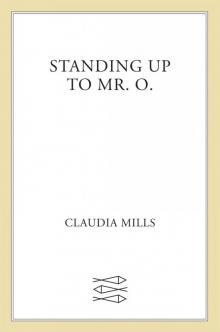 Standing Up to Mr. O.
Standing Up to Mr. O.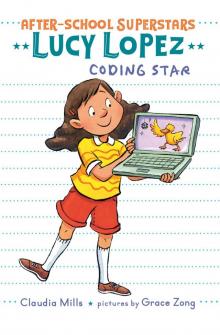 Lucy Lopez
Lucy Lopez Dinah Forever
Dinah Forever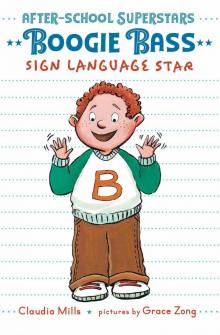 Boogie Bass, Sign Language Star
Boogie Bass, Sign Language Star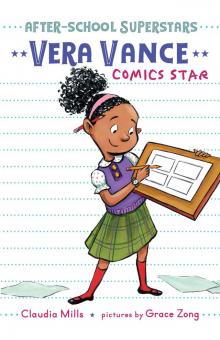 Vera Vance: Comics Star
Vera Vance: Comics Star Izzy Barr, Running Star
Izzy Barr, Running Star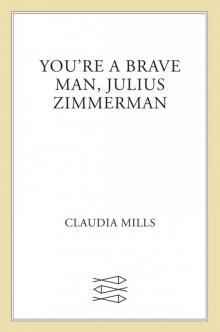 You're a Brave Man, Julius Zimmerman
You're a Brave Man, Julius Zimmerman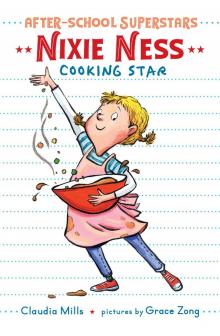 Nixie Ness
Nixie Ness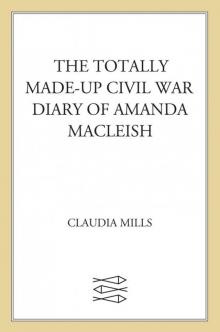 The Totally Made-up Civil War Diary of Amanda MacLeish
The Totally Made-up Civil War Diary of Amanda MacLeish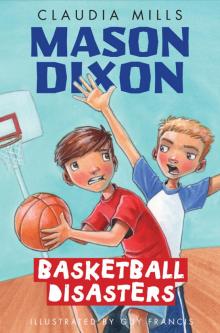 Basketball Disasters
Basketball Disasters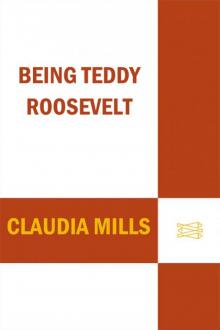 Being Teddy Roosevelt
Being Teddy Roosevelt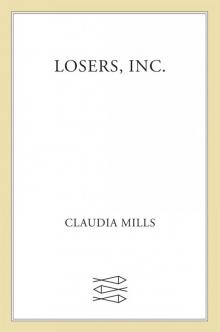 Losers, Inc.
Losers, Inc.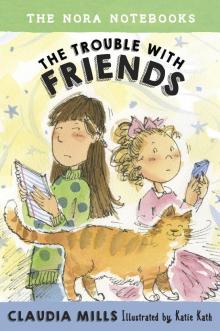 The Trouble with Friends
The Trouble with Friends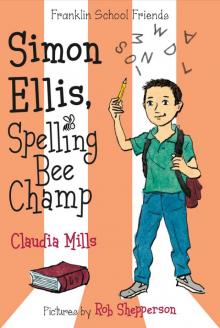 Simon Ellis, Spelling Bee Champ
Simon Ellis, Spelling Bee Champ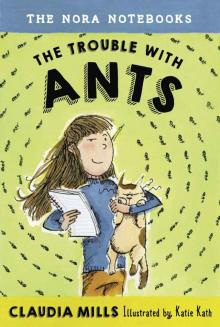 The Nora Notebooks, Book 1: The Trouble with Ants
The Nora Notebooks, Book 1: The Trouble with Ants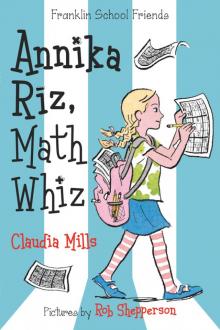 Annika Riz, Math Whiz
Annika Riz, Math Whiz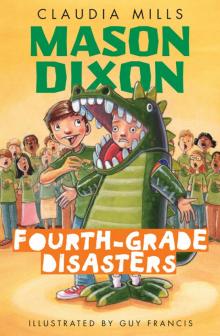 Fourth-Grade Disasters
Fourth-Grade Disasters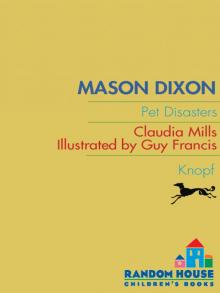 Pet Disasters
Pet Disasters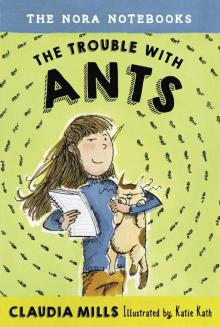 The Trouble with Ants
The Trouble with Ants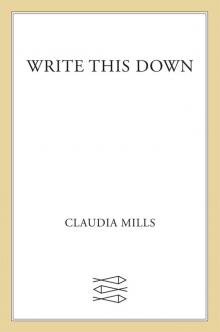 Write This Down
Write This Down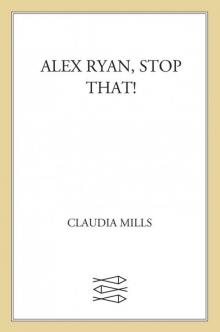 Alex Ryan, Stop That!
Alex Ryan, Stop That!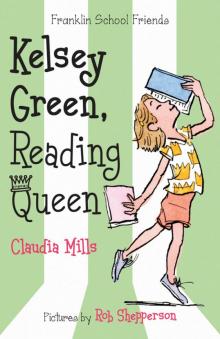 Kelsey Green, Reading Queen
Kelsey Green, Reading Queen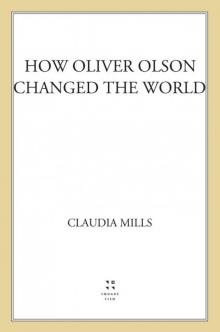 How Oliver Olson Changed the World
How Oliver Olson Changed the World Lizzie At Last
Lizzie At Last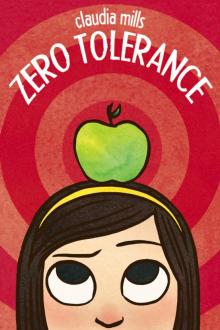 Zero Tolerance
Zero Tolerance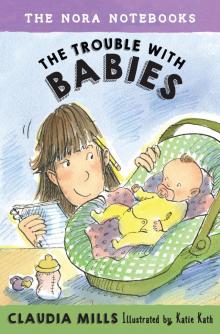 The Nora Notebooks, Book 2
The Nora Notebooks, Book 2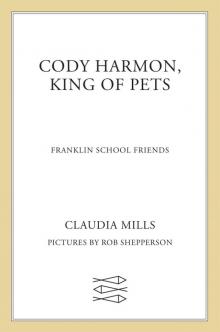 Cody Harmon, King of Pets
Cody Harmon, King of Pets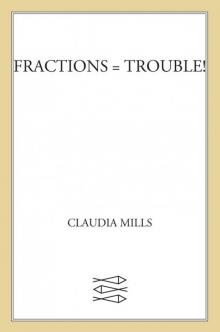 Fractions = Trouble!
Fractions = Trouble!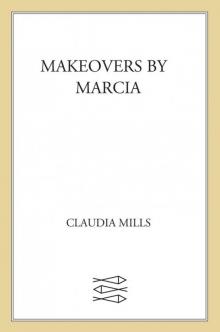 Makeovers by Marcia
Makeovers by Marcia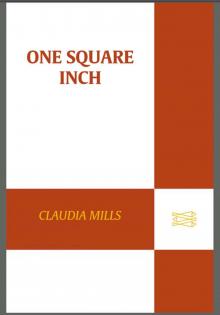 One Square Inch
One Square Inch